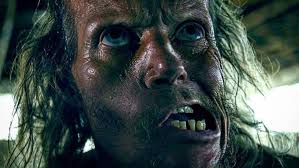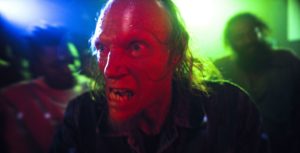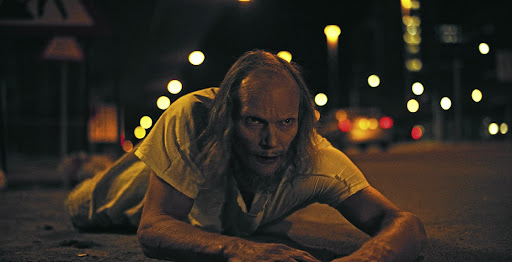The newest genre sensation from South Africa, FRIED BARRY, has a Blu-ray release that hits shelves on October 5th. Referred to in the opening credits as “a Ryan Kruger Thing”, this is the director’s first feature after a body of work consisting of short films and music videos. Kruger is clearly inspired by ‘80s genre pieces here, riffing off the works of Carpenter and Speilberg. The synth score that switches from forebodingly atmospheric to throbbingly intense is reminiscent of the former, while a plot that focuses on fathers and aliens recalls to mind films like CLOSE ENCOUNTERS and E.T.
In fact, the cover of FRIED BARRY’s Blu-ray release comes with a quote from Den of Geek that dubs it “the hard-R version of E.T.”. This comparison is hard to resist: despite the two films’ disparate tones and styles, both focus on an alien visitor who comes to Earth and embodies a key role in a family’s dynamic. If E.T. is a child’s fantasy in lieu of a father, this film is a nightmare of what an absentee father may be up to.
The film begins with Barry post-drug binge. He’s a heroin addict whose wife berates him for his failures of a fatherly nature before trudging off to a bar to get hammered with a mate. We aren’t given much more to him than this simple presentation of a man without much to offer anyone besides violence and a cold stare. That stare, however, will become crucial after Barry is abducted by aliens and replaced by an identical clone that is being piloted for some twisted purpose. What the world sees as a drug stupor the audience is clued in on being actually a visitor from space gathering information.
This is when the film works the strongest, using Barry’s identity as a drug addict ignored by the people around him to covertly pose as a spy for these outer space denizens. No one in the film takes much notice of the dirty man on the street staring for too long other than to tell him to leave them alone or to mock him in their own drunken haze. The film flirts with more social commentary, this time about South Africa’s racial injustice; a character says to Barry “I’m a little bit racist, that’s why I like it here” and one wonders if he means the bar or the country. But the film never takes any of these ideas much further than a surface level bit of commentary or a quick nod in the dialogue. There isn’t any development of these themes, as the film instead devotes much of its runtime to comedy that fails to hit its mark more often than not.

A recurring visual gag, for example, is one where the filmmakers cut to Barry’s gaping stare after something shockingly horrific happens, meant to be a bit of ironic underreaction. Where this fails, however, is in the rest of performances in the film, which often also underplay the shock of what they are witnessing. When Barry impregnates a sex worker and she gives birth within minutes, his empty stare is meant to contrast with the horror she’s just gone through. But when another man enters the scene, he reacts to this bit of body horror as if it is an inconvenience, yes, but almost an expected one in his reality. There isn’t any comedy to be found in a deadpan reaction to real horror if it’s shared by the characters who are supposed to be more human.
The comedy isn’t the only thing about the film that doesn’t work. The E.T. comparison begs the question: who is the Elliott of this story? The film seems to want to suggest this role is filled by Barry’s wife (or even the unnamed sex worker), especially in a series of scenes earlier in the film that positions the alien Barry as a superior father and husband to the old human version. But she is never given the depth that Elliott gets in his film and her desires seem to shift often. We don’t really know how she feels about her child, who she seems to never interact with, and after alien Barry has sex with her, it seems her issues with Barry have vanished as well. Chanelle De Jager embodies the role with as much humanity as she can, and does a damn good job, but the character just isn’t matching up to her effort.
By positing alien Barry as the better father/lover/general person than human Barry, the film runs up against another wall. Is alien Barry a complete innocent, who comes to the human world trying to study us for whatever reason? Or is he a monster from another dimension here to wreak havoc? While in some scenes the alien seems very aware of morality, often in interactions with children, it also maims a man early in the film for seemingly no reason. He saves one man from a heart attack, but leaves another to bleed out. His pattern is so random, it’s hard to tell what the filmmakers wanted us to take away from this alien’s visit. Was it a mission of peace? Of destruction? Of science? There’s really no way to know.
Perhaps the film’s most compelling quality is its visual style. This takes front and center in the abduction sequence, where the alien’s operating room appears to be a surrealistic black box theater. The imagery in this short section of the film ranges from the more classic probes to bizarre fleshy models and bearded figures holding glowing orbs in Kaleidoscope patterns, and it works as both darkly comic and fantastically disturbing. Gareth Place shot the film, also his feature debut, and even in the less showy scenes of the film his artistry stands out. The look of these grimey backstreets is essential to the film having any level of realism in the setting, which are necessary in grounding an audience in a story with as many surreal sequences as this.

FRIED BARRY is an ode to ‘80s genre filmmaking, a topic that’s been well explored over the last few decades of horror cinema, and doesn’t bring much new to the table. It has a few stand out sequences, and some performances and craftsmanship that keeps it from going totally off the rails, but it also never lives up to the promise of an alien using a body that is not its own to experience hedonistic pleasures. Perhaps even more so than films like CLOSE ENCOUNTERS and THEY LIVE, FRIED BARRY finds kinship with UNDER THE SKIN and THE MAN WHO FELL TO EARTH, movies about alien visitors who try to understand us and can’t, keeping a vacant stare as they process our Earthly horrors. But it can’t keep its trashy genre-love and prestigious ambitions straight, and unfortunately fails at much of both. There is something here. It just isn’t in the film enough.


No Comments